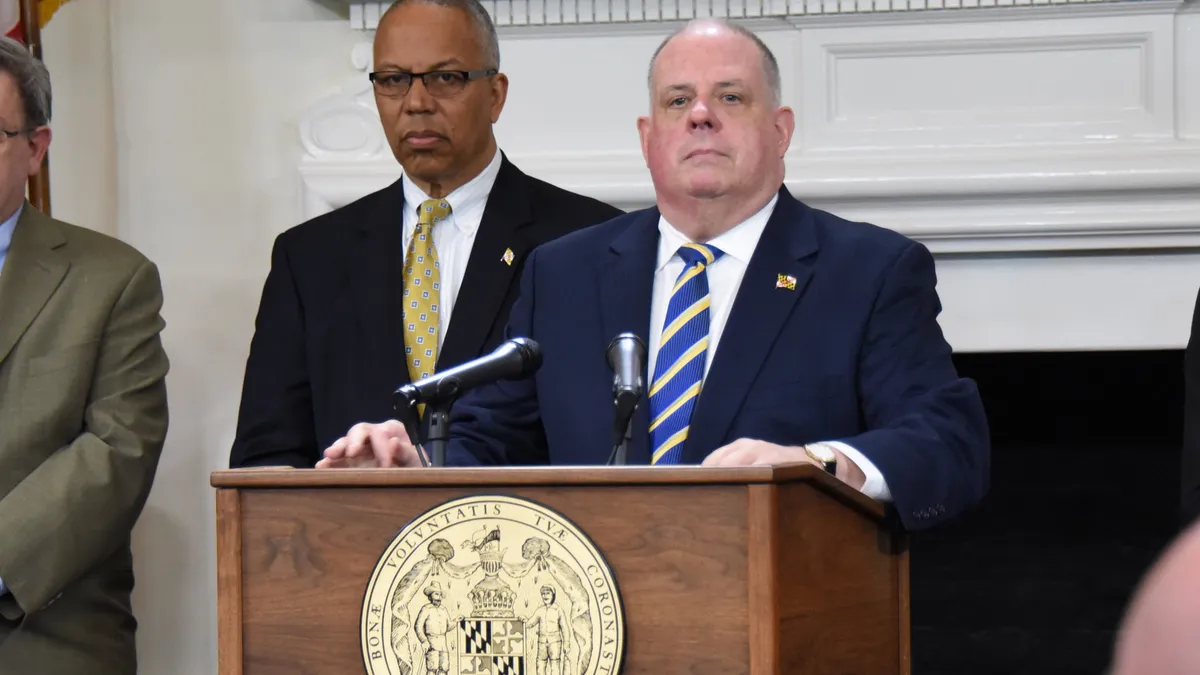UPDATE: August 19, 2020: A group of governors, five Democrats and five Republicans, are now on board to each acquire 500,000 rapid point-of-care antigen tests from BD and Quidel. On Aug. 4, the day the interstate agreement was announced, seven states had joined. Since then, Utah, Arkansas and Rhode Island have signed on.
The Rockefeller Foundation, which is working with the 10 states to acquire a total of five million antigen tests, announced on Tuesday that Arkansas and Rhode Island had joined the testing compact. The states are in "active discussions" with BD and Quidel regarding the procurement, according to the foundation, which will help set policies and protocols for the use and deployment of the tests.
Dive Brief:
- A group of seven governors led by Maryland Gov. Larry Hogan on Tuesday announced an "interstate compact" for buying and expanding use of rapid, point-of-care antigen tests in their respective states.
- The bipartisan group of governors from Republican Hogan's Maryland, Louisiana, Massachusetts, Michigan, North Carolina, Ohio and Virginia are in discussions with BD and Quidel to initially purchase a total of 3.5 million antigen tests — 500,000 per state. Other states, cities and local governments are expected to join the buying consortium in the coming days and weeks.
- BD and Quidel are so far the only two diagnostics companies to receive COVID-19 emergency use authorizations from FDA for antigen tests. William Blair analysts said the orders from the multistate agreement "alone represent nearly a quarter of the monthly capacity" for both companies combined and "as more states are likely to be added to the consortium, those too will add to a demand on a capacity that already was stretched beyond its limits."
Dive Insight:
While the FDA has granted EUAs to 166 molecular tests and 35 antibody tests, only two antigen tests, sold by BD and Quidel, have been authorized for emergency use. Nonetheless, what's attracting the states to antigen testing is that, unlike polymerase chain reaction tests, they can deliver test results in minutes rather than days.
“With severe shortages and delays in testing and the federal administration attempting to cut funding for testing, the states are banding together to acquire millions of faster tests to help save lives and slow the spread of COVID-19,” Hogan said in a statement.
In his final days as chair of the National Governors Association, Hogan's office said he negotiated the interstate agreement with the Rockefeller Foundation, which "stands ready to assist in facilitating financing" to support the initiative.
The states sent a letter of intent Tuesday to the foundation committing to a "multistate effort to establish one or more intergovernmental cooperative purchasing agreements to align and consolidate common state requirements for rapid testing technology and provide an efficient and transparent platform for ordering needed test machines and associated supplies."
The foundation last month proposed a National COVID-19 Testing & Tracing Action Plan advocating a broad U.S. push to use antigen tests, especially as LabCorp and Quest Diagnostics were struggling to keep up with increased demand for molecular diagnostic testing as coronavirus cases spiked in many states.
Lab tests “aren’t convenient, simple, or inexpensive enough to use at the scale needed,” the Rockefeller report said, calling instead for focus on ramping up antigen testing in schools, offices and beyond.
Likewise, William Blair analysts on Wednesday reiterated their contention that rapid point-of-care antigen tests will be "critically impactful in efforts to screen, track, and isolate patients in an effort to control the virus" and said they view the interstate agreement as positive for both BD and Quidel. However, the analysts also warned that relying on the two companies alone to deliver antigen tests on such a large national scale is impractical.
Quidel CEO Doug Bryant told investors on its second quarter earnings call demand for the antigen test "continues to be strong, sustained, and frankly more than we can satisfy." BD is slated to report its third quarter results Thursday morning.
Given the strain on the manufacturing capacities of BD and Quidel, William Blair analysts raised the possibility of the two companies potentially licensing their antigen tests to others with manufacturing capabilities. In particular, they said that Meridian Bioscience "has not been shy in noting it will be aggressive to showcase its manufacturing ability for these types of tests."
Abbott is also working on an antigen test, per comments on a July earnings call, but has shared few details.
William Blair analysts also said the situation could "raise the potential" for the use of the Defense Production Act by the Trump administration to bring more antigen tests to the market.
"We do not necessarily think this is a bad thing as we believe there are areas in the supply chain, such as swab manufacturing, which could benefit more from the use of that power given that is a bottleneck for increased antigen use," the analysts wrote.
The Rockefeller Foundation's testing plan last month called on the administration to invoke the DPA, or similar federal program, to jumpstart producing and distributing mass quantities of fast, low-cost antigen tests. The White House reluctantly used the Korean War-era law earlier in the pandemic to force industry's hand in producing ventilators at specific costs and delivery schedules.











